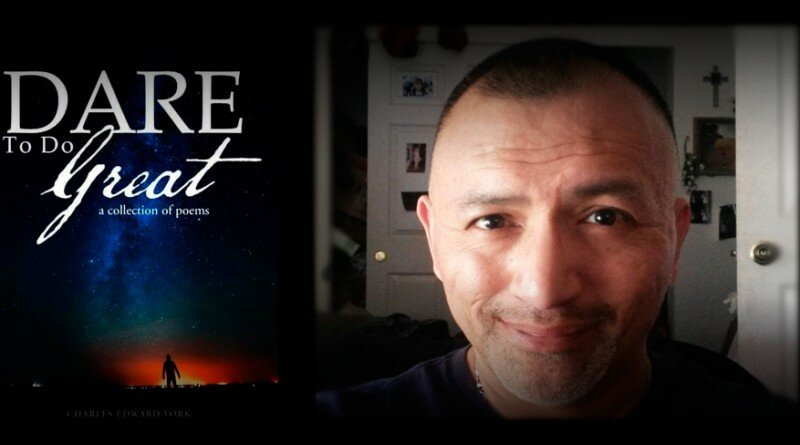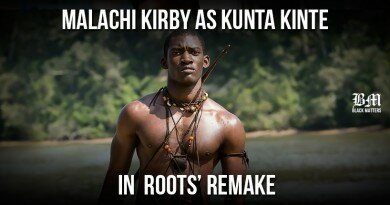blackmattersus.com
There are many issues one can think of when it comes to literary work. Why did you decide to make your work about racism, police brutality, inequality and the like. Do you have any personal experiences which made you decide to tackle this social problem in your works?
Charles Edward York
Well, I’ve never had anything happen to me personally that involves police brutality or anything like that but I think the reason why it’s important to me to write about it is that I consider myself a human rights activist as much as a poet and one of the admissions I have as a poet is to tell the truth. It’s become very obvious to me that the lives of African Americans and their civil rights are being constantly violated. And just like the Alton Sterling shooting is an example, we have policemen in a system that doesn’t allow Blacks to so much as even walk across the street or go swimming without being questioned and oftentimes the result is abuse, violence and sometimes even death. This continues to happen in such a systematic way that it is impossible as a poet or an activist to ignore that as a subject because its’ not only so important, it’s also morally reprehensible. Every time I read the headlines and see such stories I feel compelled to say something.
blackmattersus.com
Are there any parallels between current activism and the civil rights movement back in the day?
Charles Edward York
Yes, because the same level of ignorance, and bigotry is rampant not only in the system with the police but the systematic discrimination in the towns where Blacks live, the education system that continues to treat them as if they are write offs. I mean, there was a story in Idaho about last October that just finally made the headlines. It was about a young man, 17 years old – he was a football player – and two of his friends deciding to sexually abuse a young black man who was playing on their team. And that story was finally prosecuted when it was realized that not only did this happen to a disabled person, it happened to an African American. And the whole town of Dietrich, Idaho was in on the cover up. Because clearly, there are racist people there, and that’s just one example. It’s so important to write about it especially now. You read about the Supreme Court saying that the technical parts of the 1964 voting rights act is unconstitutional, what do you think is going on? And we have a Congress that’s made up primarily of Republicans, made up primarily of Whites who say “you know what, the Black Man, he’s a second class citizen. He always will be. We can get away with this, and even if there’s a Black president, we can still prevent more rights being given to them.” To me this is just completely unacceptable.
blackmattersus.com
Why do you think the authorities are turning a blind eye to what’s going on?
Charles Edward York
I think for many reasons. First and foremost, it’s because of racism. It’s because we have a small chunk of Caucasians mainly from the South, who refuse to acknowledge African Americans as equal. They always have since the civil war ended. Secondly, you have a system, even the welfare system up until a couple of years ago had racial bias that said White people need more money under welfare than Black people because Black people don’t need it much. I’m like, “who believes in that sort of thing?” There aren’t any numbers to even substantiate that sort of thing. And yet I heard about it again yesterday and I was like “oh my God, the whole system is rigged against us!” Because if it’s rigged against one minority, it’s rigged against everyone. When you have even a small minority in a country that is denied basic civil and economic rights, then you have nobody sharing equality. Unfortunately it hasn’t only worked against African Americans. It’s worked against Hispanics, immigrants, against Native Americans to some degree. That to me is unacceptable. You can’t expect a certain group of people to prosper if you’ve got everything in the system set up to deny them those opportunities.
blackmattersus.com
Your style of poetry seems very revolutionary. Who do you take inspiration from?
Charles Edward York
I take inspiration from several people. In my early years I was – I still am – a student of Martin Luther King Jr., and Mahatma Gandhi, but at the same time I take my inspiration from a poet named Pablo Neruda. He was a senator in the government of Chile and he wrote a lot of poems that dealt with the poor, the marginalized, people who were having to suffer lots of hardship and were getting nothing from the government that promised them all kinds of things like prosperity, equal rights and so on. And because he wrote about these things so passionately, I took it upon myself that I should do the same because there was no point in writing poetry dressed up like perfume in pretty words. What I’m trying to remind people of today – if you’re a poet – is that you need a social conscience, you need to be writing about these things. Why? Because these are the things that matter, these are the things that affect people’s lives and these are the things that aren’t going to go away if poets aren’t writing about them. I tell people, poetry is the literature of conscience, it’s not a set of pretty perfumed words that are supposed to deliver nice, neat little stories. It’s got to tell the truth, reveal beauty and move hearts and minds. That’s the reason why I write about these things, because those are the issues that are important not just to me, but should be important to every single writer out there.
blackmattersus.com
Apart from poems, have you had any physical activism experiences?
Charles Edward York
I participated in a protest a long time ago against something that was just as important. Back in 2003, the U.S chose to go to war with Iraq. I was actually there with a friend of mine as an observer and I ended being a participant. Why? Because those people were saying we’re not going to war for the right reasons and they were saying it was because of the oil wars. And – I kind of knew this all along – it was because we made up a bunch of lies that there were nuclear and chemical and biological weapons there and that we would fight al Qaeda and those two things were simply not true. If you need to write something relevant you need to write the truth. So from that moment on, I sort of became an activist in the shadows because I thought if I’m ever going to write anything important, I have to write about the truth and I started writing poems about that. I wrote a poem called the “the Poet and the Painter”. It was about Bush and all the things that he was promising and what I saw was nothing more than just a smokescreen for lies and fabrications and basically taking away people’s rights, demonizing the other side and going to war for nothing more than profit. Unfortunately, thousands of people lost their lives for that, and he can’t deny that. I’ve tried to write about these things all over Facebook and Twitter. I’m not a civil rights activist in the sense that I’m not there protesting like it’s happening in Ferguson. I would have loved to go to Ferguson, Missouri. I’ve been there two times in my life and I never saw the racism that’s going on there but after that story broke, I thought to myself “oh my God, this is an ugly trend that’s beginning to show its face.” And unfortunately that kind of thing happens and doesn’t get reported and now it’s getting reported but we still have the same results. People are dying. On the other hand people are getting off innocent and that to me is unacceptable.
blackmattersus.com
Would you say that was the turning point in your life?
Charles Edward York
Yeah it was because I couldn’t just ignore what the truth was. I couldn’t ignore that other side was trying to bring to life things that were kept in the shadows. I tell people, truth is transparent. Only lies require camouflage. And I saw a lot of camouflage going on with the war, and the truth wasn’t getting reported. So that was a simple demonstration but it worked. And when they realized there was nothing, there was no explanation for that. So it was quite a turning point for me.
blackmattersus.com
What were you doing before you became a poet.
Charles Edward York
I was born the first son of a U.S navy veteran who served in the Vietnam War. As I grew up I read about what happened in the Vietnam War and the mistakes that were made, the bad intentions that we went into it with, and also about the cruelty that happened on both sides. As I grew up, I started to look at the world from a “world” point of view as opposed to just the “American” point of view. My dad was a racist but I grew up with a completely different kind of mentality. My dad thought me that you need to see the world from different points of view. And I just thought that how ironic that my dad is a war veteran who’s still using the ‘n’ word toward black people. So I went to him and was like, how would you like it if I walked around and people called me a chink or a slant eye, that wouldn’t sound right. And so I tried to get him to understand that. My belief is that no one on the planet should be given a second class rating for anything. All lives are important. I learnt a lot about that when I was studying Buddhism in my 30s and about that as a Christian and as a poet. Because I started to see the world for what it was. And it doesn’t only mean the things that look nice, it also means the ugly truth that sometimes people try to ignore.
blackmattersus.com
In your opinion, is your poetry changing people’s opinion about the Black Man, about racism, about discrimination?
Charles Edward York
Well, part of my message is not just to change the face of poetry but to restore its heart. What I mean by that is that poetry now has become like the 1% versus the 99%. The 1% in the literary world believe that poetry is the property of literary critics and the fine art establishment. And half of the things that I read on the shelves today, they don’t talk about social issues, bigotry, the marginalized, they don’t even talk about Democrats. And you don’t even have immigrant poetry featured anywhere. And for me that is unacceptable too because for me poetry was always about people, always the literature of conscience. For social commentary, for social justice, you have to write about that too. Because if you are not writing about that, you are no better than a cupcake that has frosting on it. You may look pretty and sweet, but you are not going to nourish anybody.
blackmattersus.com
What are you engaged in now?
Charles Edward York
Since I was fired from a job 2 years ago because I wrote a letter of grievance against another employee that was harassing me, and when I found out that my boss was involved in the corrupted bureaucratic system, I wasn’t quite surprised it happened but I was shocked nonetheless. Because I realized I was being fired for telling the truth. I even went to a newspaper but they didn’t want to report the story. So I made a determination from that moment on that I was going to get serious about my writing. And since then I’ve applied for tons of jobs in this county, nobody wants to hire me, no surprise, but I made a decision in November of 2014 that I was going to be totally committed to writing. I was going to write poetry, essays and commentaries, even novels about this one sensual theme of pronouncing justice where it didn’t exist. Since then I’ve written 5 books all of which are published. I’m working on number 6 right now and they’re all books of poetry. I’ve written over 500 poems and a lot of those poems deal with social injustice, racism, bigotry, inequality, but I also write poems about relationships, about love, about sex, about everyday life. A lot of people say I’m being brave for writing about these things but I think I’m not being brave, I’m just telling you what’s happened. And I’m trying to convey it in a way that gets you to notice.
blackmattersus.com
Can you tell me more about “Burden of the Black Man?”
Charles Edward York
Yeah. When I wrote the Burden of the Black Man it was like a very short synopsis about what it means being African American in America. Several things came back to me about how Black people were being shot and no one was being held accountable. The songs that they sang in the field all the way to the rap that they produce, they’re not just art pieces of suffering, they’re messages of people crying out for justice and equality. And I honestly believe in that. I don’t just say that because people are angry. Just like Jesse Williams said at the BET awards, they’ve been getting up for years saying something about this and then they get criticized and he made it known in his speech. You think you can just tell those people to sit down and shut up? And I followed that up with, I am somebody, I’m not just a number that you can ignore. I have life. And so I sat down to write this. And do you know what the burden of the black man is? It is that he has to be the conscience for the rest of the human race. When everybody else wants to ignore him, when everybody else wants him to shut up, he’s the one who has to come along and say “You know what? I’m not going to let you burden me with this, because I’ve put up with this for so long. I’m not going to let it go quietly, I’m going to speak for myself. I am prepared to be heard.” You can’t ignore injustice. Cause sooner or later it will come back as resentment and later on, as revolution.








